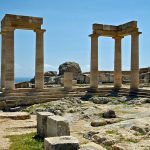We say that substance is one of the genera of things (Aristotle’s ten categories), and that it is divided (as simple) into two parts: the one as matter, that which in itself it is not such and such a thing (for it is deprived of the form), the other as shape and form, according to which a thing when it receives its form is called a certain ‘this’; and thirdly (as compound) in the sense of that which is compounded of these.
Now matter is potency while form complete reality (perfection and completion). The latter in two ways: either as knowledge is (i.e. as state), or as theorizing is (i.e. as actuality). Bodies seem to be, for the most part, substances, and especially the natural bodies; for they are principles of all other bodies (i.e. of both artificial and mathematical bodies).
Of natural bodies some have life in them, others not; by life we mean self-nutrition and increase and diminution. Thus every natural body which has life in it is a substance in the sense of a compound.
So then, since there is such a body, i.e. having life in it, the body cannot be soul; for the body is not of things that are said of a subject, but stands rather as subject or matter. Hence the soul must be a substance in that of the form of a natural body having potentially life in it. Again, substance is complete reality; the soul, therefore, must be a complete reality of such a body.
Complete reality
This complete reality is said of in two different ways: the one as knowledge (i.e. as state), the other as theorizing (i.e. as actuality). Clearly, then, as knowledge; for there is both sleeping and waking in the existence of the soul, and waking corresponds to theorizing, sleeping to having knowledge but not using it. Further, knowledge is prior in origin to theorizing in virtue of the same thing.
The soul
This is why the soul is the first complete reality (just as knowledge is) of a natural body having potentially life in it. Such is whatever is organic. The parts of plans are organs also, but quite simply, e.g. the leaf serves to shelter the pericarp, the pericarp to shelter the fruit. The roots of plants correspond to the mouth; for they both absorb the food.
So if we have to say something common for every soul, it will be that it is the first complete reality of a natural organic body. This is why we don’t need to ask for the soul and the body whether are one or not (for the body is made by nature in order to receive the soul), nor whether the wax and its shape are one, or, in short, the matter of each thing and that of which it is the matter (the form). For both unity and entity are spoken of in more than one way, but mainly of that of the complete reality.
Bibliography: Aristotle De anima
Translation – text editing: George Kotsalis





